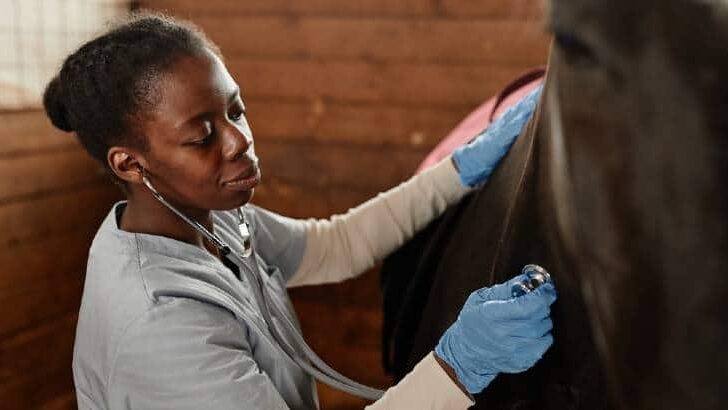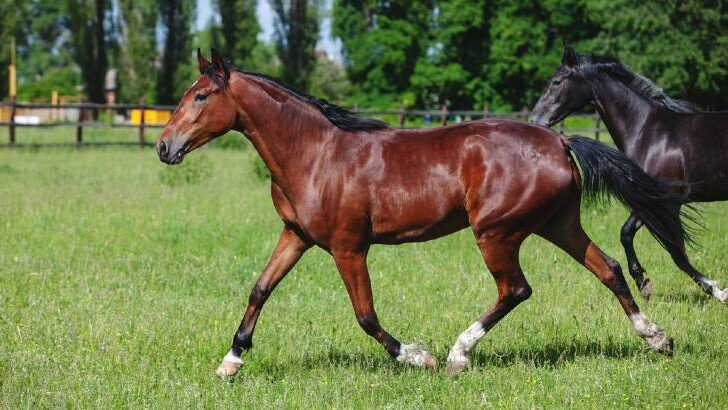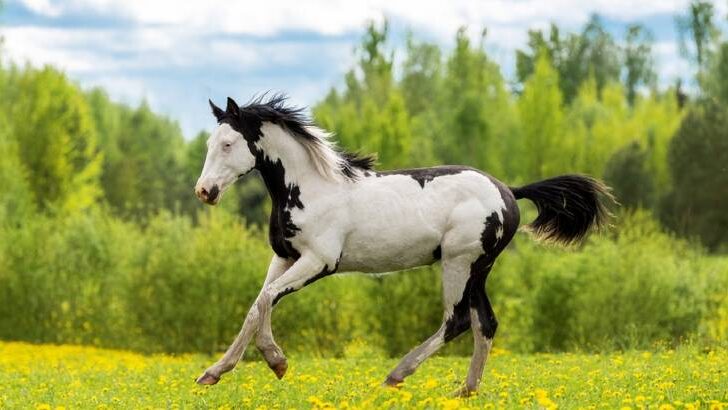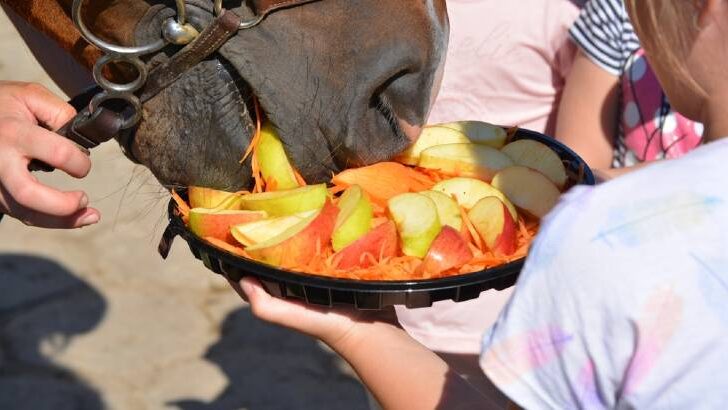Affiliate Disclaimer
As an Amazon Associate I earn from qualifying purchases. It helps me keep the website going. Thank you for your support.
Selling a horse can be stressful at the best of times. But selling a horse that windsucks or has any other stable vice raises other issues that can complicate the process. Here are some of the things that can be helpful to know.
Many buyers are prepared to purchase a horse that windsucks. However, as a seller, you may have a smaller pool of prospective buyers. And buyers will most likely want to know a lot about the horse’s vice. In addition to this, they may use it as a way to negotiate the price down.
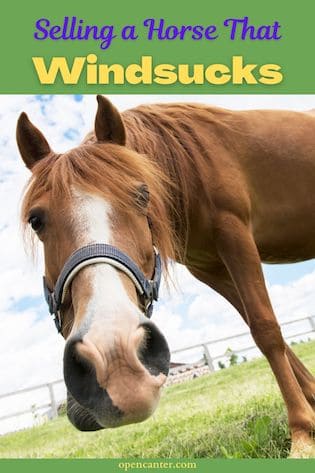
Selling a Horse that Windsucks – What to Expect
Here are some of the issues that you need to consider moving forward with the sale…
1) Smaller Pool of Buyers
Buyers will have different feelings about buying a horse that windsucks. Some buyers will be unphased by this vice and wouldn’t let it stop them if they like your horse. Others will have mixed feelings and will be willing to visit the horse and discuss it with you. And then there will be some buyers for whom windsucking is a deal breaker.
So, selling a horse that windsucks is absolutely possible. But you will may find that the pool of interested potential buyers is smaller.
2) Expect Close Scrutiny from Buyers
Buying a horse is a significant investment and responsibility, and most buyers will approach it very carefully, wanting as much information as possible about the horse.
This is particularly true if the buyer knows that the horse windsucks. Don’t be surprised if a potential buyer wants to see how the horse behaves in the stable, and also when they are turned out.
Many buyers are savvy to the fact that a horse may not windsuck much in the field but will behave quite differently when stabled. And a serious buyer will want to get as clear a picture of the vice as they can to make an informed decision.
Don’t feel too stressed if a buyer asks you a lot about the horse’s windsucking behavior. In all likelihood, they are just trying to get as much information as they can.
These questions can be a good sign, they are what salespeople call ‘buying signals’. If a buyer is asking questions, it’s an indication that they are weighing up the pros and cons of a purchase.
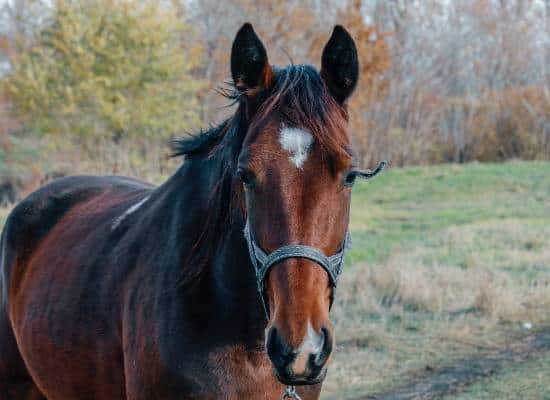
3) The Pre-Purchase Exam
It’s also likely that a potential buyer will ask the vet who carries out the pre-purchase exam (PPE) to look out for any issues connected to windsucking.
Windsucking has been linked with the following:
- Difficulty in the horse putting on and maintaining weight
- Colic
- Equine gastric ulcers
- Enlarged muscles on the lower side of the neck
There is some disagreement between vets about how conclusive the research is on links between windsucking, colic, and ulcers. Nevertheless, it’s a common concern, and something the vet is likely to pick up on in the PPE.
PPE exams are not pass/fail tests. They are designed to give an overall picture of the horse’s well-being at that point in time. And to give the prospective buyer an idea of whether the horse is what they are looking for.
It’s important to let the buyer choose their own vet to do the PPE. This will give the buyer some assurance that the information they are getting is impartial.
If the buyer has gotten to the point of arranging a PPE then you know that windsucking is not a deal breaker for them. They will have to consider whether what the vet flags in the exam are something they feel that they can manage.
Sometimes what comes up in the PPE will be used as a point of negotiation around the horse’s sale price. So, let’s take a look at prices now…
4) The Asking Price
The price that you will get for a horse like anything else boils down to supply and demand. This is a basic economic principle. The price that you can ask for something depends on how many are available (the supply), and how many people want it (demand).
When a horse has a vice, this can affect the sale price, because the demand goes down. Basically, fewer people are interested in buying a horse with a vice such as windsucking. The demand doesn’t go down completely. Plenty of people will still be interested in buying, just not as many as if the horse didn’t have the vice.
How much windsucking affects the price will depend on a few factors. Some of those are:
- How much time does the horse spend windsucking? Is it now and again? All the time? Only after feeding?
- Has the horse had any health-related issues that a vet has suggested were connected to windsucking?
- What was the outcome of the PPE?
- How does the prospective buyer feel about the vice and how much they are prepared to pay?
Some sellers will set an initial sale price at a lower rate to reflect the fact that the horse windsucks. Others will set their price based on the horse’s well-being and abilities. They are then prepared to negotiate with the buyer as discussions about the horse progress.
Unfortunately, there is no magic percentage calculator that will tell you how much less you will get when selling a horse that windsucks. The final price will vary on a case-by-case basis and depends on the horse, the buyer, the PPE, and you.
5) Your Disclosure
The other question that you may be wondering about is when to let any prospective buyers know that the horse windsucks. Do you mention it in the written advert? Do you wait until an interested party responds to an advert and reaches out for further information?
It’s important to know that in many countries there are laws in place to protect buyers and sellers. Laws about consumer rights vary from country to country. In the US, horse sellers are obliged by law to disclose anything that is likely to affect the buyer’s decision and the horse’s value (source).
For that reason, it’s a good idea to familiarize yourself with what your local legislation requires you to disclose and when. You may be required in your country to specify any vices in the initial written advert. This would be something to investigate.
If a horse is sold and a vice is not disclosed, most countries will have laws in place to protect the buyer. This means that if a horse is misrepresented, then the sale of contract may become void. As a result, the buyer may be entitled to a refund.
Legality aside, there is a good argument for being upfront with prospective buyers about the horse you want to sell. Sellers are sometimes worried that if they mention a vice in an advert it will put buyers off.
It’s almost certainly true that some buyers will be put off. However, these buyers would most likely be put off by a vice regardless of when they learned about it. So, being transparent is a way to save yourself and the buyer time. Also, being upfront is a way of fostering trust between you and the buyer from the get-go.
Final Thoughts
Selling a horse is often an emotional time. It can be a difficult decision to make. If you throw a stable vice into the mix, it can make the process feel more complicated. Sometimes selling a horse that windsucks can take a little longer. But there are always exceptions to the rule, and a good horse with a quirky habit may be snapped up at a fair price.

